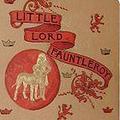Chapter 2 (8)
"That's a good thing to have," said Ceddie innocently. "I wish I had a great deal of money." "Do you?" said Mr. Havisham. "And why?" "Well," explained Cedric, "there are so many things a person can do with money. You see, there's the apple-woman. If I were very rich I should buy her a little tent to put her stall in, and a little stove, and then I should give her a dollar every morning it rained, so that she could afford to stay at home. And then--oh! I'd give her a shawl. And, you see, her bones wouldn't feel so badly. Her bones are not like our bones; they hurt her when she moves. It's very painful when your bones hurt you. If I were rich enough to do all those things for her, I guess her bones would be all right." "Ahem!" said Mr. Havisham. "And what else would you do if you were rich?" "Oh! I'd do a great many things. Of course I should buy Dearest all sorts of beautiful things, needle-books and fans and gold thimbles and rings, and an encyclopedia, and a carriage, so that she needn't have to wait for the street-cars. If she liked pink silk dresses, I should buy her some, but she likes black best. But I'd, take her to the big stores, and tell her to look 'round and choose for herself. And then Dick--" "Who is Dick?" asked Mr. Havisham.
"Dick is a boot-black," said his young; lordship, quite warming up in his interest in plans so exciting. "He is one of the nicest boot-blacks you ever knew. He stands at the corner of a street down-town. I've known him for years. Once when I was very little, I was walking out with Dearest, and she bought me a beautiful ball that bounced, and I was carrying it and it bounced into the middle of the street where the carriages and horses were, and I was so disappointed, I began to cry--I was very little. I had kilts on. And Dick was blacking a man's shoes, and he said 'Hello!' and he ran in between the horses and caught the ball for me and wiped it off with his coat and gave it to me and said, 'It's all right, young un.' So Dearest admired him very much, and so did I, and ever since then, when we go down-town, we talk to him. He says 'Hello!' and I say 'Hello!' and then we talk a little, and he tells me how trade is. It's been bad lately." "And what would you like to do for him?" inquired the lawyer, rubbing his chin and smiling a queer smile.
"Well," said Lord Fauntleroy, settling himself in his chair with a business air, "I'd buy Jake out." "And who is Jake?" Mr. Havisham asked.
"He's Dick's partner, and he is the worst partner a fellow could have! Dick says so. He isn't a credit to the business, and he isn't square. He cheats, and that makes Dick mad. It would make you mad, you know, if you were blacking boots as hard as you could, and being square all the time, and your partner wasn't square at all. People like Dick, but they don't like Jake, and so sometimes they don't come twice. So if I were rich, I'd buy Jake out and get Dick a 'boss' sign--he says a 'boss' sign goes a long way; and I'd get him some new clothes and new brushes, and start him out fair. He says all he wants is to start out fair." There could have been nothing more confiding and innocent than the way in which his small lordship told his little story, quoting his friend Dick's bits of slang in the most candid good faith. He seemed to feel not a shade of a doubt that his elderly companion would be just as interested as he was himself. And in truth Mr. Havisham was beginning to be greatly interested; but perhaps not quite so much in Dick and the apple-woman as in this kind little lordling, whose curly head was so busy, under its yellow thatch, with good-natured plans for his friends, and who seemed somehow to have forgotten himself altogether.
"Is there anything--" he began. "What would you get for yourself, if you were rich?" "Lots of things!" answered Lord Fauntleroy briskly; "but first I'd give Mary some money for Bridget--that's her sister, with twelve children, and a husband out of work. She comes here and cries, and Dearest gives her things in a basket, and then she cries again, and says: 'Blessin's be on yez, for a beautiful lady.' And I think Mr. Hobbs would like a gold watch and chain to remember me by, and a meerschaum pipe. And then I'd like to get up a company." "A company!" exclaimed Mr. Havisham.
"Like a Republican rally," explained Cedric, becoming quite excited. "I'd have torches and uniforms and things for all the boys and myself, too. And we'd march, you know, and drill. That's what I should like for myself, if I were rich." The door opened and Mrs. Errol came in.
"I am sorry to have been obliged to leave you so long," she said to Mr. Havisham; "but a poor woman, who is in great trouble, came to see me."

